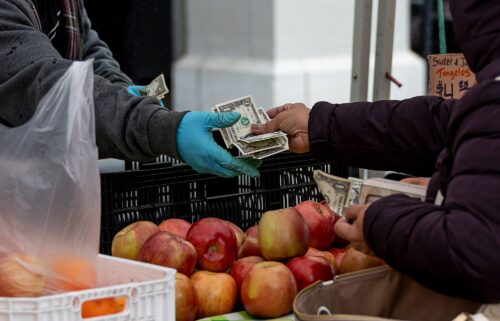Zong Qinghou, the Chinese beverage billionaire who took on Danone and won, dies
By Nectar Gan, CNN
Hong Kong (CNN) — Zong Qinghou, the rags-to-riches founder of one of China’s biggest beverage makers, has died.
The self-made billionaire, who was once China’s richest man, died of an illness on Sunday at the age of 79, his company Hangzhou Wahaha Group said in a brief statement, without providing further details.
In China, Zong was known as a legendary businessman who grew his soft drinks empire from a tricycle cart hawking ice pops to school kids into a conglomerate selling everything from milk drinks to bottled water and canned porridge.
Zong was also hailed as a national hero for wrestling full control of Wahaha, which means “laughing child,” from its French partner Danone more than a decade ago. Victory in that bitter battle boosted Zong’s wealth to $8 billion, making him China’s richest man in 2010 and again in 2012, according to Forbes.
His death was mourned across China. Condolences poured in from prominent Chinese entrepreneurs including Alibaba (BABA) co-founder Jack Ma and Xiaomi CEO Lei Jun. Wahaha employees and residents in the eastern city of Hangzhou laid flowers outside the company.
Zong is survived by his wife and his daughter, Zong Fuli, who has long been groomed as his successor.
The beverage tycoon’s rise came to embody the can-do spirit of China’s first generation of private entrepreneurs, who helped propel the country’s explosive economic growth in the years after it moved away from Chairman Mao Zedong’s class struggle to embrace market reforms in the late 1970s.
Despite his wealth, Zong was known for his frugal lifestyle, which set him apart from many of China’s new rich. He was nicknamed “the richest man in cloth shoes” for always sporting plain black shoes, complete with a dark jacket and slacks.
In an interview with the state-run People’s Daily in 2010, Zong said the title had brought little change to his life.
“Every day, I still smoke two packs of cigarettes that cost 12 yuan (then $1.80) each, have two cups of tea, and eat my three meals at the company canteen,” he said.
He was known for starting work around 7 am and not leaving the office until 11 pm, working for more than 12 hours a day long before the grueling “996” work schedule became commonplace. 996 refers to working 9 am to 9pm, six days a week.
A poverty-stricken childhood
Born in 1945 in wartime China, Zong grew up desperately poor in Hangzhou and often went hungry. His father was unemployed, and his mother supported the family of five children on a monthly salary of 40 yuan as a factory worker, he said in an oral history book marking 40 years of China’s economic reforms.
“Because of the hardship, as I child I had many dreams and hoped to make big money to repay my parents,” he said.
As the eldest child, Zong left school after junior high to support his family and spent more than a decade doing odd jobs, including hard manual labor at a remote state-owned farm during Mao’s Cultural Revolution, when millions of young urban Chinese were sent to the countryside to “undergo re-education by poor peasants.”
In 1978, the year Deng Xiaoping ushered in China’s economic reforms, Zong returned to Hangzhou and spent the next decade working as a salesman, sometimes traveling to the southern metropolis of Guangzhou for trade fairs.
“My only dream at that time was to have my own company and do what I wanted to do, and I had been looking for such an opportunity,” he said in the oral history book.
The opportunity finally came in 1987. Zong, 42, borrowed 140,000 yuan (then about $38,000) to set up his own retail company, selling ice pops and stationery to students at a nearby elementary school.
The company, which employed only two retired teachers and sold ice pops for a penny each, would later become Wahaha, which is privately owned.
During his door-to-door sales, Zong learned that many children were picky eaters and suffered from varying degrees of malnutrition, which was a big headache for parents. Spotting a potential opportunity, he partnered with a professor of nutrition to invent a vitamin drink for children, called Wahaha Oral Liquid.
The product proved a huge hit, boasting nearly 100 million yuan (about $19 million at the time) in annual sales in the third year of its release. That year, Zong founded the Hangzhou Wahaha Group after acquiring a failing state-run canned food factory.
Battle with Danone
By 1996, Wahaha had expanded its products to milk drinks, carbonated beverages and bottled water, and Zong came up with a long-term business plan that required investment worth hundreds of millions of yuan.
Securing a loan of this size from state-owned banks was difficult at the time, and Zong turned to foreign capital, according to the 2010 profile of Zong in the People’s Daily.
Wahaha partnered with Danone, which acquired a controlling 51% stake in the joint ventures.
But the partnership soured in 2007, when Danone publicly accused Wahaha of making and selling Wahaha-branded drinks outside their joint ventures and cutting the French company out of the earnings.
Zong accused Danone of orchestrating a “hostile takeover” and trying to buy out Wahaha’s stake at a low price.
The feud escalated into a high-profile legal battle that made into the agenda of a meeting between then Chinese and French presidents in Beijing, according to Chinese media reports at the time.
The dispute was eventually settled in 2009, with Danone selling its stake for about $500 million and ceding all control to Wahaha.
Zong later described the legal battle as a “beautiful self-defense counterstrike to defend the dignity and interests of a national enterprise.”
The-CNN-Wire
™ & © 2024 Cable News Network, Inc., a Warner Bros. Discovery Company. All rights reserved.

